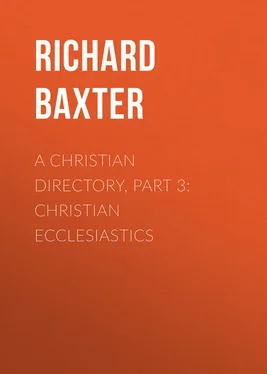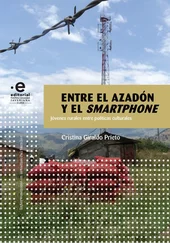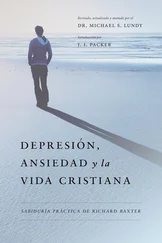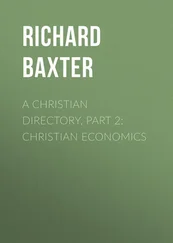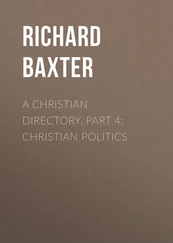Richard Baxter - A Christian Directory, Part 3 - Christian Ecclesiastics
Здесь есть возможность читать онлайн «Richard Baxter - A Christian Directory, Part 3 - Christian Ecclesiastics» — ознакомительный отрывок электронной книги совершенно бесплатно, а после прочтения отрывка купить полную версию. В некоторых случаях можно слушать аудио, скачать через торрент в формате fb2 и присутствует краткое содержание. Жанр: foreign_antique, foreign_prose, на английском языке. Описание произведения, (предисловие) а так же отзывы посетителей доступны на портале библиотеки ЛибКат.
- Название:A Christian Directory, Part 3: Christian Ecclesiastics
- Автор:
- Жанр:
- Год:неизвестен
- ISBN:нет данных
- Рейтинг книги:3 / 5. Голосов: 1
-
Избранное:Добавить в избранное
- Отзывы:
-
Ваша оценка:
- 60
- 1
- 2
- 3
- 4
- 5
A Christian Directory, Part 3: Christian Ecclesiastics: краткое содержание, описание и аннотация
Предлагаем к чтению аннотацию, описание, краткое содержание или предисловие (зависит от того, что написал сам автор книги «A Christian Directory, Part 3: Christian Ecclesiastics»). Если вы не нашли необходимую информацию о книге — напишите в комментариях, мы постараемся отыскать её.
A Christian Directory, Part 3: Christian Ecclesiastics — читать онлайн ознакомительный отрывок
Ниже представлен текст книги, разбитый по страницам. Система сохранения места последней прочитанной страницы, позволяет с удобством читать онлайн бесплатно книгу «A Christian Directory, Part 3: Christian Ecclesiastics», без необходимости каждый раз заново искать на чём Вы остановились. Поставьте закладку, и сможете в любой момент перейти на страницу, на которой закончили чтение.
Интервал:
Закладка:
99
Bishop Jer. Taylor of Repentance, Pref. "I am sure we cannot give account of souls of which we have no notice."
100
Ignat. Epis. ad Philad. Vid. Mead's Disc. of Churches, p. 48-50.
101
Tertull. de Coron. Milit. c. 3.
102
It is very observable that Acosta saith, l. vi. c. 12, that they found it an old custom among the Indians to confess their sins to the priests before the gospel came thither.
103
See more in Dr. Hammond, ibid.
104
Vid. Canon. Apost. 5. 32. Et Concil. Antioch. c. 5. Et Concil. Carthag. 4. Can. 35.
105
Vid. Just. Mart. Apol. 2. Vid. Tertul. Apol. c. 39.
106
I hope all this will tell you what a bishop indeed is.
107
Grot. de Imp. p. 273. Pastorum est ordinare pastores. Neque id officium eis competit, qua hujus aut illius ecclesiæ pastores sunt, sed qua ministri ecclesiæ catholicæ.
108
See in Grotius de Imper. sum. potest. p. 269. The necessary distinction of, 1. Ipsa facultas prædicandi sacramenta et claves administrandi, quod Mandatum vocat. 2. Applicatio hujus facultatis ad certam personam, viz. Ordinatio. 3. Applicatio hujus personæ ad certum cœtum et locum, viz. Electio. 4. Illud quo certa persona in certo loco ministerium suum exercet publico præsidio ac publica authoritate, viz. Confirmatio, p. 273. Constat muneris institutionem a Deo esse; ordinationem a pastoribus, confirmationem publicam a summa potestate. So that the doubt is only about election. Which yet must be differenced from consent.
109
See my Disput. with him of the Successive Visibility of the Church, p. 336.
110
Cyprian. Epis. 68. Plebs obsequens præceptis dominicis a peccatore præposito separare se debet. Which Grotius de Imper. p. 230, citing saith, Jubentur enim singuli, multo magis universi, cavere prophetas falsos, alienum pastorem fugere, ab iis declinare qui dissidia faciunt et offensas contra doctrinam. 2. Imperatur fidelibus familiarem eorum consuetudinem declinare, qui fratres, &c. 2 Cor. v.; Rom. xvi. 17; John x.; 2 Tim. iii. 6; 2 Thess. iii. 6, 14; 2 Cor. iv. 3, 4.
111
Satan or their own worldly advantages, saith Dr. Hammond. Dan. i. 12, 13; Ezek. iv. 12, 15. Read c. iii. Acosta excellently rebuking the negligence of their priests that taught the Indians the catechism idly, and without explication, or calling them to account about the sense, and then laid all the fault on the blockishness of the people, when Tota catechizendi ratio erat umbratilis, et ludicræ similis: ego vero (inquit) si homines ingenio acerrimo, et discendi percupidi tales præceptores nacti essent, nihil aliud quam ut duplo ignoratiores evaderent, doceri isto modo arbitrarer. Olim in symbolo addiscendo et intelligendo, mysteriisque fidei agnoscendis viri ingenio præstantes et literatura celebres, diu in catechumenorum ordine tenebantur, cum ecclesiastica disciplina vigeret; neque ante ad fidei sacramentum admittebantur, quam multas ab episcopo de symbolo conciones audissent, diu et multum cum catechista contulissent; post quas omnes curas et meditationes, magnum erat si recta sentirent, consentanea responderent, &c. And he addeth, p. 360, Equidem sic opinor, neque ab ea opinione avelli unquam potero, quin pessimo præceptori omnes esse auditores hebetes credam. A bad teacher hath always bad scholars. Even in the Roman church how little their authority can do against profaneness and negligence, the same Acosta showeth, l. 6. c. 2. p. 519. Cum in provinciali concilio Limensi ab omnibus Peruensibus episcopis cæterisque gravibus viris ad ea vitia emendenda multum operæ et studii collatum sit, atque edita extent egregia decreta de reformatione permulta, nihil tamen amplius perfectum est, quam si ab otiosis nautis de republica moderanda consultatum esset. Bonific. Mogunt. Ep. iii. mentioneth it as the error of a new-sprung sect, that heinous sinners even so continuing may be priests. And Ep. lxxiii. it is said, No man may be made a priest, that hath sinned mortally after baptism, and, Si iis qui tam in episcopatu vel presbyterio positus mortale peccatum aliquod admiserit, non debet offerre panes Domino, quanto magis patienter retrahat se ab hoc non tam honore quam onere, et aliorum locum qui digni sunt non ambiat occupare. Qui enim in erudiendis et instituendis ad virtutem populis præest, necesse est, ut in omnibus sanctus sit, et in nullo reprehensibilis habeatur. Qui enim aliquem de peccato arguit, ipse a peccato debet esse immunis. Auct. Bib. Pat. Tom. ii. p. 81. If there were somewhat too much strictness in the ancient exclusion of them that heinously sinned after baptism from the priesthood, let us not be as much too loose.
112
Est enim mirabilis quædam continuatio seriesque rerum, ut alia ex alia nexa, et omnes inter se aptæ colligatæque videantur. Cic. De Natur. Deor. pag. 6.
113
By all this it is easy to gather whether a pastor may do his work per alium . Saith Grotius de Imp. p. 290, 291, Nam illud quod quis per alium facit per se facere videtur ad eas duntaxat pertinet actiones quarum causa efficiens proxima a jure indefinita est. Yet people should labour after such maturity and stedfastness, that they might be able to stand if their pastors be dead or taken from them by persecution, yea, or forsake the truth themselves. Victor. Utic. saith of the people in Africa when their pastors were banished, and others might not be ordained in their steads: Inter hæc tamen Dei populus in fide consistens, ut examina apum cereas ædificantia mansiones, crescendo melleis fidei claviculis firmabatur. Quanto magis affligebantur, tanto magis multiplicabantur. Victor. p. 382.
114
We may not offer any violence, but only persuade: we have not so great authority given us by the laws, as to repress offenders; and if it were lawful for us so to do, we have no use of any such violent power: for that Christ crowneth them which abstain from sin, not of a forced, but of a willing mind and purpose. Chrys. citante Bilson of Subjection, p. 526. Et ibid. ex Hilar. If this violence were used for the true faith, the doctrine of bishops would be against it: God needeth no forced service. He requireth no constrained confession. I cannot receive any man but him that is willing: I cannot give ear, but to him that entreateth, &c. Ita et Origen. ibid. citat. 2 Cor. i. 24; Gal. i. 7, 8; 2 Cor. x. 8; xiii. 10.
115
Acts xviii. 24, 26, 27; Rom. xvi. 3; John iii. 8; Eph. iv. 29; 1 Pet. iv. 11; Phil. ii. 15; Matt. v. 16; 1 Pet. iii. 1, 2; 2 Pet. iii. 11: 1 Pet. i. 15, 16; ii. 12; Heb. iii. 13; Heb. x. 24.
116
1 Thess. v. 12, 13; 2 Tim. ii. 10; 2 Cor. iv. 15; 1 Thess. iii. 9; i. 5; Matt. xxvi. 56; 2 Tim. iv. 16; Gal. vi. 6, 10; 1 Cor. ix.; Col. i. 24.
117
Nitebatur Socrates summi ingenii acumine, non tam illos ex sententia refellere, quam ipse quid verum esset invenire. Laert. in Socrat.
118
Heb. xii. 14. 2 Cor. v. 17; Rom. viii. 9, 13.
119
Socrates de ethice, et in officinis, et in publico quotidie philosophans, ea potius inquirenda hortabatur, quæ mores instruerent, et quorum usus nobis domi esset necessarius. Laert. in Socrat.
120
Non tam auctoritatis in disputando, quam rationis momenta quærenda sunt, Cic. Nat. Deo. p. 6. Obest plerumque iis, qui discere volunt, auctoritas eorum, qui se docere profitentur. Desinunt enim suum judicium adhibere: id habent ratum, quod ab eo, quem probant, judicatum vident. Ibid. p. 7.
Читать дальшеИнтервал:
Закладка:
Похожие книги на «A Christian Directory, Part 3: Christian Ecclesiastics»
Представляем Вашему вниманию похожие книги на «A Christian Directory, Part 3: Christian Ecclesiastics» списком для выбора. Мы отобрали схожую по названию и смыслу литературу в надежде предоставить читателям больше вариантов отыскать новые, интересные, ещё непрочитанные произведения.
Обсуждение, отзывы о книге «A Christian Directory, Part 3: Christian Ecclesiastics» и просто собственные мнения читателей. Оставьте ваши комментарии, напишите, что Вы думаете о произведении, его смысле или главных героях. Укажите что конкретно понравилось, а что нет, и почему Вы так считаете.
